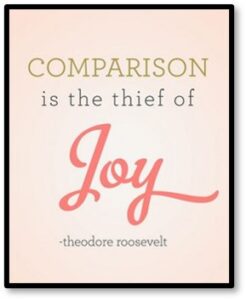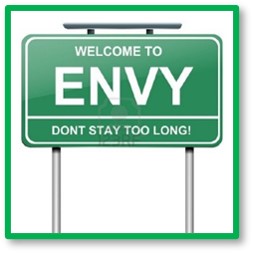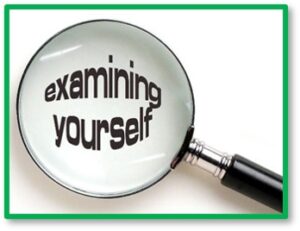Monday Author: Susanne Skinner
Occasionally a hard topic throws itself in front of my bus. I’m talking about envy or wanting what someone else has. It generally happens when I take my own blessings for granted. Envy is not a bad thing, especially when it gut-checks me back onto my own path.
 Life involves recalculating, redirecting and reviewing our journey and that inevitably leads to some ‘comparing ourselves to others’ moments.
Life involves recalculating, redirecting and reviewing our journey and that inevitably leads to some ‘comparing ourselves to others’ moments.
Comparison isn’t bad. In fact, it’s human. We’re all a bit insecure; seeking an external frame of reference to tell us how we’re doing. It’s a jolt of motivation and encouragement, often pushing us towards our own self-improvement.
The bad part comes if it creates feelings that imply we just don’t measure up. It’s a classic compare and despair trap.
The Social Comparison Theory
Psychologists call this the social comparison theory. It usually involves the big three: work, wealth and relationships. These are the main categories for validating yourself against someone else’s metrics and achievements.
Comparing yourself to others is a barricade to appreciating your own worth and accomplishments. Using someone else to validate personal growth and achievement magnifies insecurities and unfairly weights the differences. Someone is always going to be doing better that you. Women do this more often than men; comparing themselves to each other to evaluate their own worth.
Unfairly measuring yourself against others creates feelings of inadequacy and hopelessness. Empower yourself by looking inward and concentrating on what you do well. Create your own rules of accomplishment and use them to define your success.
Everyone Does It
 We all fall into the comparison trap—it’s human nature to assess our weaknesses against other’s strengths. We look at what we don’t have, measure it against what others do have, and mistakenly equate material possessions with happiness.
We all fall into the comparison trap—it’s human nature to assess our weaknesses against other’s strengths. We look at what we don’t have, measure it against what others do have, and mistakenly equate material possessions with happiness.
Envy is another word for the pain we feel when we believe another person has an advantage over us. It’s a normal emotion and there’s no getting rid of it. We learn to manage it as we mature, acknowledging it and letting it go.
Social media is a breeding ground for envy. It creates a carefully curated window into the lives of others. People we know, people we kind of know, and even people we don’t know affect our self-worth on social media. We see an idealized image, created for our viewing pleasure.
Once upon a time social media was a valued connection but lately it serves as a platform to outdo what we just did. It cultivates envy for the experiences others have more than the material purchases they own.
Status Anxiety
In his book The Road to Character, David Brooks writes about opportunities to rethink our priorities in how we see ourselves. He makes the distinction between traits he calls resume virtues and eulogy virtues.
“The resume virtues are the ones you list on your resume, the skills that you bring to the job market and contribute to external success. The eulogy virtues are deeper. They are the virtues that get talked about at your funeral, the ones that exist at the core of your being-whether you are kind, brave, honest, or faithful: what kind of relationships you formed.”
It’s something to think about. External validation, especially through social media, focuses on resume virtues. We prioritize ‘likes’ over character and attention over awareness.
The smack-upside-the-head reality of it is this: you want the admiration of the person who has what you envy.
Look Outward, Not Inward
All of this brings me to my own introspection and self-analysis. Our move to Florida came with mindful downsizing in all aspects of our lives. We scaled our lifestyle to now, and to twenty years from now. I miss the home we had, but I do not want to recreate it here. I am learning to live with less, finding joy and peace in my small space.
 This does not prevent me from envying the beautiful homes of friends. We have everything we need and we know it, but occasionally I wish for the big house again. Envy is human and I freely admit to it. Sometimes I think about moving to a bigger house and indulge in the fantasy. But that’s all it is—fantasy.
This does not prevent me from envying the beautiful homes of friends. We have everything we need and we know it, but occasionally I wish for the big house again. Envy is human and I freely admit to it. Sometimes I think about moving to a bigger house and indulge in the fantasy. But that’s all it is—fantasy.
We all fall victim to our ego’s desire for affirmation. Measuring how we feel against other people’s success means we will always find someone doing better. Accepting ourselves for who and where we are frees us from the comparing and despairing trap.
Refusing to be defined by a job, house, zip code, bank account or possessions makes room for bigger and better emotions. It allows us to look outward, offering opportunities to use our gifts in the service of others.
Live Well
The compare and despair trap operates on a simple principle: You want what another person has because you believe it will make you happier and increase your self-worth.
The antidote is also simple: Happiness and self-worth are feelings you create with your thoughts, not your possessions.
Contentment comes from wanting what we have. When our time on earth is over eulogy virtues—the time, talent and kindness we extend to others—define us. Nothing else matters.
The road ahead of us is much shorter than the road behind us. Create a life that feels good on the inside as well as one that looks good on the outside.
